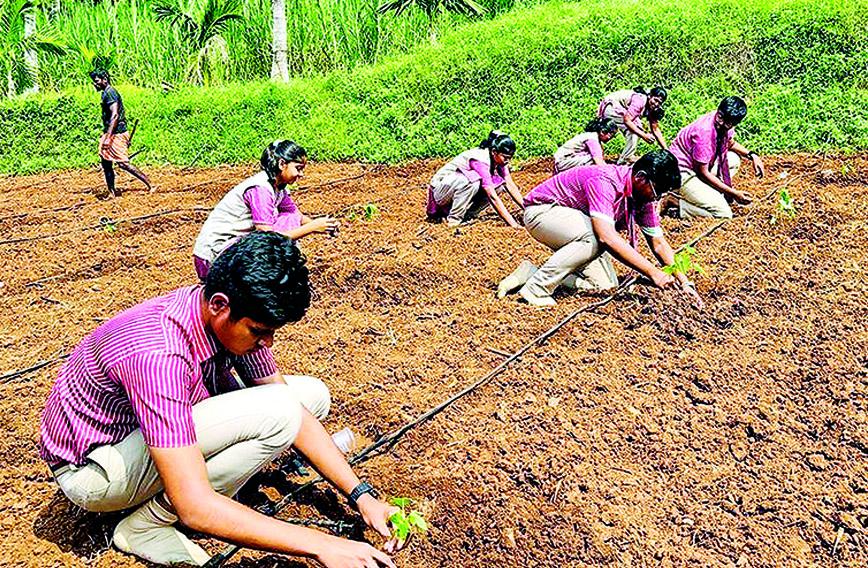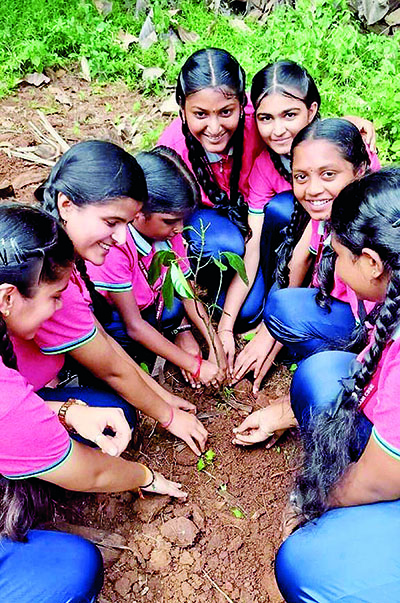
Students are taught weeding, digging, planting, watering
Students learn farming by getting down to it
Shree Padre, Kasaragod
Every week two or three teams of curious schoolchildren turn up at Deesan Farms, in Chittoor taluk of Palakkad district, to learn about farming. They get their hands dirty too. They dig, weed, plant, water and apply mulch. They visit the dairy farm and study the value-added unit which makes 22 products for sale.
In the past five years 5,000 students from 50 schools have come to Deesan Farms for a holistic understanding of the food cycle.
“We don’t expect them all to become farmers,” says Jnana Saravanan whose family owns the farm. “But they should grow up with a clear idea of where their food comes from, how poisons enter the food chain, the kind of food they should consume. If they have a clear perspective on all this, we’d be happy.”
The name Deesan is derived from Jagadeesan, the name of Saravanan’s father. He developed this organic coconut garden which is completely chemical-free and self-reliant. Coconut husk and fallen leaves are pulverized, composted and fed back to the trees as manure. Nothing is wasted.
Saravanan is the main instructor in this unusual farm schooling initiative. His entire family, including his father, Jagadeesan, younger brother, Sargunan, and the latter’s wife, Sanghavi, as well as Saravanan’s wife, Krishnasudha, play supporting roles in teaching the children. Altogether the family spends around 100 hours every month mentoring groups of schoolchildren.
They educate farmers too. Teams of farmers also arrive from Kerala and Tamil Nadu to learn about organic farming.
“There are hundreds of ways in which our youngsters can opt for a profession that helps them lead a sustainable life. Unfortunately, school curricula don’t educate them on health, culture or sustainable lifestyles. They don’t get such education in their schools. This should change,” says Saravanan.
URBAN TO RURAL
Saravanan is a human resources expert. Sargunan is an MBA. They both had lucrative jobs in Chennai a decade ago. But a tragic incident radically changed their perspective. A friend’s three-year-old child was diagnosed with blood cancer. The brothers were shocked.
“We couldn’t figure out the reason for this tragedy. Except perhaps for our urban lifestyle,” recalls Saravanan, “This heartbreaking incident made us resolve to return to our farm.”
However, their return to their roots wasn’t without challenges. “All the elders from farming families we knew advised us not to leave our jobs. There was no profit and no happiness in farming, they warned us,” says Saravanan.
 Jnana Saravanan with a batch of schoolchildren at his farm
Jnana Saravanan with a batch of schoolchildren at his farm
Instead of giving up, Saravanan and Sargunan decided to work things out. They identified specific areas in farm management that needed improvement.
After many innovations and extensive hard work, they turned around their farm and made it into a self-reliant and sustainable entity. “We can certainly make farming profitable. After all, 180 crore people in India, most of them consumers, require food,” reasons Saravanan.
“We have sufficient engineers, doctors and software techies. We don’t have enough farmers,” he says.
“In my village it is the elderly parents who are somehow managing their farms. Out of 20 families, just one has a child who has returned from the city and become a farmer. Each family has sufficient agricultural land. The second generation has jobs in the city,” says Saravanan.
FARM TO FORK
Deesan Farms has designed a half-day programme for schoolchildren. It comprises a demo of farming practices, practical sessions and a tasting session where children sample naturally grown fruits or vegetables. Saravanan’s eight-year-old son, Pugalmati, is also a little farmer growing vegetables in their kitchen garden.
 |
|
Children are encouraged to handle the soil |
School teams arrive at Deesan Farms at 10.30 am. The lessons end at 2 pm. The session begins with a Power Point presentation by Saravanan to acquaint students with the basics of life, food and farming. Subjects covered include how water and soil are formed, where our food comes from, the arduous effort put in by farmers to grow food, climate change, pests and diseases, and how agriculture is completely dependent on the vagaries of nature and market trends.
Next is the practical class. Children are asked to remove their shoes and chappals and enter the field barefoot. Many crops are grown on the farm. There is a dairy farm as well. Manure from the cattle shed is fed to the trees through an automatic fertigation plant. The farm makes its own vermicompost and compost. Value-added products are made in a unit and sold online.
Students are taught weeding, digging, and other primary cultivation tasks. The group then shares the work of digging pits, planting, watering and mulching the plant basin with green manure. They are encouraged to ask questions. While at work, they are treated to fruits from the farm like papaya and guava. At the end of the session, they will be given a non-traditional lunch of sprouted grains washed down with guava leaf tea.
“Farmers are invariably emotionally attached to plants, trees, soil, water and livestock. We try to reconnect children too by inspiring them to touch and feel soil, plants, fruits and flowers. Contiguously, we explain their importance in farming and food production. We talk about sustainable farming, poison on our plates, how farm waste can be recycled to produce food, and so on,” says Saravanan. A few easy-to-do activities, like making balls of soil, have been designed so that children understand this concept better.
Deesan Farms makes traditional coconut oil, virgin coconut oil and hair oil from their organic coconuts. Milk from their dairy is converted into ghee and butter. In addition, there is dosa mix, turmeric powder, millet powders and more. Raw material is procured from local farmers. In all, 22 food products are made here. Krishnasudha and Sanghavi manage the unit.
The farm schooling programme ends with a visit to the value-addition unit. Saravanan explains each step in simple language — how to value-add crops, best practices, dos and don’ts, packaging, and marketing, including online marketing.
A girl studying in the senior secondary section said, “The lessons we learn in school are quite different. Here we have learnt the intricacies of life and farming. When we grow up, we will pass on this knowledge to the next generation.”
Saravanan has received many awards for his work: the Best Jaivik Farmer Award 2019 from the Kerala government, and the Best Farmer Award from the Sarojini Damodaran Foundation, also in 2022.
“Connect children with nature and not just with gadgets. We need AI: not artificial intelligence but agricultural information,” he quips.
Contact: Deesan Farms — 99626 88000
Comments
Currently there are no Comments. Be first to write a comment!





